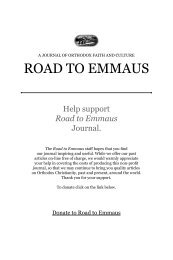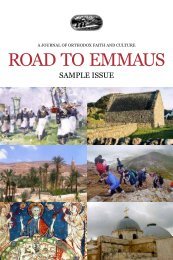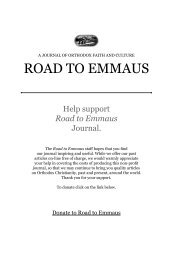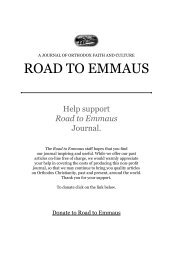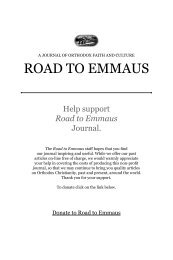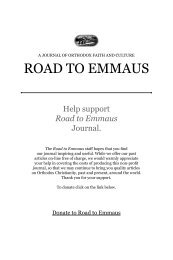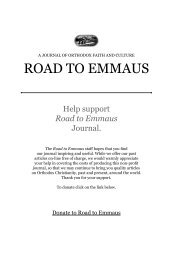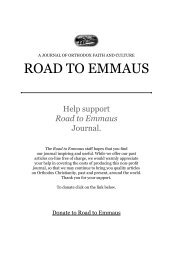Banished Faith: The Exile of Christian Pontus - Road to Emmaus ...
Banished Faith: The Exile of Christian Pontus - Road to Emmaus ...
Banished Faith: The Exile of Christian Pontus - Road to Emmaus ...
You also want an ePaper? Increase the reach of your titles
YUMPU automatically turns print PDFs into web optimized ePapers that Google loves.
<strong>Road</strong> <strong>to</strong> <strong>Emmaus</strong> Vol. IX, No. 1 (#32)BANISHED FAITHthe tsar invited Armenians and Greeks <strong>to</strong> emigrate <strong>to</strong> the newly-held terri<strong>to</strong>ry,replacing thousands <strong>of</strong> Muslims who were returning <strong>to</strong> Turkey. Anumber <strong>of</strong> Russians also settled in Kars: army troops, public administra<strong>to</strong>rs,school teachers, and merchants. Many Greeks, particularly formercryp<strong>to</strong>-<strong>Christian</strong>s, accepted the tsar’s invitation.Under the Russian administration, churches and schools were built, andpan-Slavism became so prevalent that, within a generation, young Greekswere speaking Russian in lieu <strong>of</strong> Greek from attending Russian schools.<strong>The</strong>re were 79 Greek villages in the Kars region, and the capital city wascrowned by the Greek Orthodox Cathedral <strong>of</strong> the Transfiguration(Metamorphosi), <strong>to</strong> which Tsar Nicholas II donated a bell weighing 3,200kilos (over 7,000 lbs.) with a rich <strong>to</strong>ne that could be heard for many miles.<strong>The</strong> Kars refuge lasted until the Russian troop withdrawal <strong>of</strong> 1918, and in1921, eager <strong>to</strong> regain their lost terri<strong>to</strong>ries, Turkey quickly came <strong>to</strong> termswith the young revolutionary Russian government. Lenin returned theregion <strong>to</strong> Turkey as part <strong>of</strong> the settlement <strong>of</strong> the Treaty <strong>of</strong> Kars, saying, “<strong>The</strong>Greeks are servants <strong>of</strong> imperialism in Asia Minor, and Mustafa Kemal[Ataturk] is our future friend and collabora<strong>to</strong>r.”For the most part, those Black Sea <strong>Christian</strong>s who chose <strong>to</strong> remain in<strong>Pontus</strong> co-existed peacefully with their Muslim neighbors. Living side byside in small villages, political or religious friction that would upset the balance<strong>of</strong> village life was discouraged. A single trac<strong>to</strong>r or cultiva<strong>to</strong>r <strong>of</strong>tenserved the entire village, both Greek and Muslim fields; where neighborswere dependant on one another, it was difficult <strong>to</strong> create lasting enmity.Later religious tensions and mistreatment <strong>of</strong> <strong>Christian</strong>s were rarely initiatedlocally, but by regional or national governors, militant Turkish nationalists,or roving bands <strong>of</strong> thugs, while local Muslims <strong>of</strong>ten attempted <strong>to</strong> curtailthe intimidation and violence.Metropolitan Gervasios SoumelidesOne well-known Kromnian <strong>of</strong> this period after the revelation <strong>of</strong> the cryp<strong>to</strong>-<strong>Christian</strong>s was Gervasios Soumelides, born in 1820 <strong>to</strong> a family <strong>of</strong> pr<strong>of</strong>essed<strong>Christian</strong>s in Varenou, the village where my ances<strong>to</strong>r, Mullah Molasleyman,simultaneously served as both the local mullah and the cryp<strong>to</strong>-<strong>Christian</strong>priest. Until 1836, Gervasios worked as a s<strong>to</strong>ne-carver in the mines <strong>of</strong> Ala Dagin Cilicia, but after permanently injuring his leg, he returned <strong>to</strong> <strong>Pontus</strong> andbecame a monk at the monastery <strong>of</strong> Panagia Soumela. He later attended the<strong>The</strong>ological School in Halki, served in Constantinople, and in 1864 becameMetropolitan <strong>of</strong> Chaldia, eight years after the Hatti Humayun allowed thecryp<strong>to</strong>-<strong>Christian</strong>s <strong>to</strong> reveal their <strong>Christian</strong>ity.As metropolitan, he helped fill the Kromni area with churches and schools,and out <strong>of</strong> his own salary paid for more than forty-five young men <strong>to</strong> study inFrench and German universities. <strong>The</strong>y became doc<strong>to</strong>rs, lawyers, and engineers.He also <strong>to</strong>ok up the cause <strong>of</strong> women’s education, complaining<strong>to</strong> the local assembly, “We increase the number <strong>of</strong>scholars and scientists, but there is no education for thegirls. <strong>The</strong>y must study also.” <strong>The</strong> men objected, “Butwho will marry my daughter if she is educated?” Inresponse, the metropolitan instituted a school fororphan girls, <strong>to</strong> which no one could object, and fromthere, women’s education spread. My maternal grandmother,Parthena Orologa, and her brother Gervasioswere small children when their parents died, and bothlived at the orphanage. My grandmother became a teacherand was later direc<strong>to</strong>r <strong>of</strong> the Girl’s School <strong>of</strong> Argyroupolis(now Gümüshane), and her brother became bishop <strong>of</strong>Caesarea. He was afterwards transferred <strong>to</strong> Korca inAlbania, and finally <strong>to</strong> Ioannina in northern Greece where, in 1914, during hisepiscopacy, the Greek army marched in and Ioannina was freed from fourcenturies <strong>of</strong> Ot<strong>to</strong>man rule. Thanks <strong>to</strong> Metropolitan Gervasios, all <strong>of</strong> the men<strong>of</strong> my mother’s family received a good education.Uncle Epaminondas and Faruk <strong>of</strong> ArgyroupolisMetropolitan <strong>of</strong>Chaldia, GervasiosSoumelides, <strong>of</strong>Kromnian descent.<strong>The</strong>re is an amusing s<strong>to</strong>ry from this time, <strong>to</strong>ld years later by my mother’sbrother, Epaminondas Sotiriadis, who, as a youth in 1903-4, was summonedfrom Gümüshane <strong>to</strong> Ioannina <strong>to</strong> study near his uncle, this same bishop <strong>of</strong>Ioannina. He made the journey from Trebizond <strong>to</strong> Constantinople, and fromConstantinople by Italian freighter <strong>to</strong> the port <strong>of</strong> Agioi Saranda (nowAlbania). <strong>The</strong> last leg <strong>of</strong> his journey was by Austrian post carriage travelingfrom Agioi Saranda <strong>to</strong> Ioannina with the mail. High in the mountains theys<strong>to</strong>pped at a village inn. Shocked, he wrote home, “Imagine the poverty!Here I have seen my own Greek people cooking eggs with olive oil!” This was45



